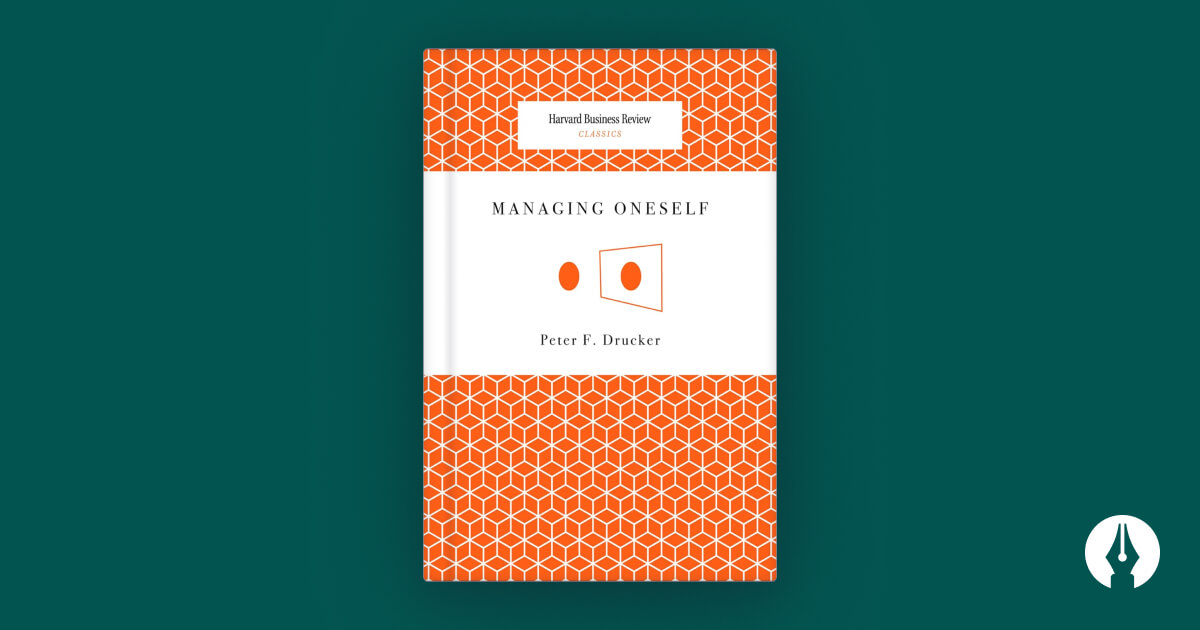The book offers penetrating insights into the business that still resonate today. You’ll learn about self-education, mindset, and self-management.
It’s a short but powerful book on self-awareness and management. Peter F. Drucker explains timeless concepts in a simple way yet provokes deep thinking about one’s future.
Biggest lesson: Knowing yourself will not only set you free but will allow you to grow and reach your full potential.
Summary
Concentrate on your strengths. Put yourself where your strengths can produce results.
One should waste as little effort as possible on improving areas of low competence.
Some people learn by doing. Others learn by hearing themselves talk.
Managing yourself requires taking responsibility for relationships.
| Author | Peter F. Drucker |
|---|---|
| Publication year | 2007 |
| Category | Business & Money |
| My rating | ⭐️⭐️⭐️⭐️⭐️ |
| Buy on Amazon | Kindle |
Notes & Quotes
Most people think they know what they are good at. They are usually wrong.
One cannot build performance on weaknesses, let alone on something one cannot do at all.
We need to know our strengths in order to know where we belong.
Whenever you make a key decision or take a key action, write down what you expect will happen. Nine or 12 months later, compare the actual results with your expectations.
First and foremost, concentrate on your strengths. Put yourself where your strengths can produce results. Second, work on improving your strengths.
Comparing your expectations with your results also indicates what not to do. We all have a vast number of areas in which we have no talent or skill and little chance of becoming even mediocre.
One should waste as little effort as possible on improving areas of low competence.
The first thing to know is whether you are a reader or a listener. Far too few people even know that there are readers and listeners and that people are rarely both.
Some people learn by doing. Others learn by hearing themselves talk.
Am I a reader or a listener? and How do I learn? are the first questions to ask. But they are by no means the only ones. To manage yourself effectively, you also have to ask, Do I work well with people, or am I a loner? And if you do work well with people, you then must ask, In what relationship?
Some people work best as team members. Others work best alone. Some are exceptionally talented as coaches and mentors; others are simply incompetent as mentors.
Do I perform well under stress, or do I need a highly structured and predictable environment? Do I work best in a big organization or a small one? Few people work well in all kinds of environments.
To be effective in an organization, a person’s values must be compatible with the organization’s values. They do not need to be the same, but they must be close enough to coexist.
What are my strengths? How do I perform? and, What are my values? And then they can and should decide where they belong.
Successful careers are not planned. They develop when people are prepared for opportunities because they know their strengths, their method of work, and their values
First, the results should be hard to achieve—they should require “stretching,” to use the current buzzword. But also, they should be within reach. To aim at results that cannot be achieved—or that can be only under the most unlikely circumstances—is not being ambitious; it is being foolish. Second, the results should be meaningful. They should make a difference. Finally, results should be visible and, if at all possible, measurable. From this will come a course of action: what to do, where and how to start, and what goals and deadlines to set.
Managing yourself requires taking responsibility for relationships.
The first is to accept the fact that other people are as much individuals as you yourself are.
The first secret of effectiveness is to understand the people you work with and depend on so that you can make use of their strengths, their ways of working, and their values.
The second part of relationship responsibility is taking responsibility for communication.
Organizations are no longer built on force but on trust. The existence of trust between people does not necessarily mean that they like one another. It means that they understand one another.
We will see many more second careers undertaken by people who have achieved modest success in their first jobs.
Wherever there is success, there has to be failure. And then it is vitally important for the individual, and equally for the individual’s family, to have an area in which he or she can contribute, make a difference, and be somebody.
In effect, managing oneself demands that each knowledge worker think and behave like a chief executive officer.
